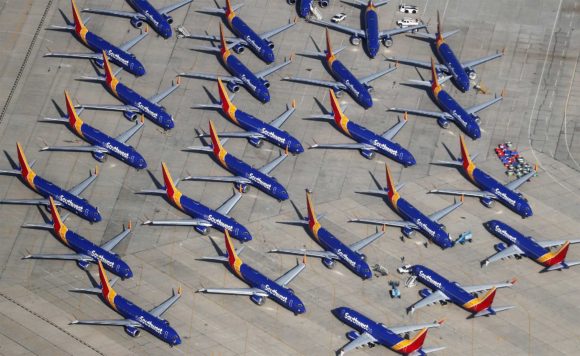Airlines on Thursday urged global regulators to coordinate on measures needed to bring the grounded 737 MAX jetliner back into service, as Boeing grappled with a new technical glitch and investors sold shares of suppliers over fears of more disruption.
Airlines are now warning of the prospect of flights being disrupted beyond the end of the busy summer period when the grounding of over 300 MAX jets and a delivery halt affecting at least 100 more has caused cancellations and high leasing bills.
The 737 MAX was grounded worldwide in March in the wake of two accidents in five months, which prompted Boeing to redesign part of an automated software system suspected of playing a role in the crashes that also involved faulty sensor data.
The International Air Transport Association, a body representing some 290 airlines and over 80% of global traffic, said technical requirements and timelines for the safe re-entry to service of the 737 MAX should be aligned.
The statement came a day after an IATA summit to discuss the grounding of Boeing’s top-selling passenger jet – the second such meeting held in recent weeks.
It also followed news on Wednesday, first reported by Reuters, that the U.S. Federal Aviation Administration had identified a new risk that Boeing must address on the 737 MAX before it can start flying again.
The FAA did not elaborate on the latest setback, but sources familiar with the matter told Reuters it was discovered during a simulator test last week. It was not yet clear if the issue could be addressed with a software upgrade or would require a more complex hardware fix.
Boeing shares fell 4% to $359.78 in pre-market trade, while shares of some suppliers, such as Britain’s Senior Plc, also dropped sharply.
Downgrading its rating on Senior to “equal weight”, Barclays said it expected a widespread “supplier reset” following the grounding of the 737 MAX, with the impact on 2020 results not yet factored into analysts’ consensus forecasts.
“Aviation is a globally integrated system that relies on global standards, including mutual recognition, trust, and reciprocity among safety regulators,” IATA said.
“Aviation cannot function efficiently without this coordinated effort, and restoring public confidence demands it,” IATA added, calling also for global alignment on additional training requirements for 737 MAX flight crew.
Travel firm TUI said on Thursday it did not expect an additional financial impact after the FAA’s latest warning on the 737 MAX. TUI has already taken a 300 million euro ($341 million) hit to remove the jet from its summer schedules.
China was first to ground the MAX after a March 10 crash in Ethiopia within five months of a similar crash off Indonesia, killing a combined 346 people.
Once regulators approve the MAX for flight, airlines must remove the jets from storage and implement new pilot training, a process that will differ for each airline but that U.S. carriers have said will take at least one month.
Some airlines and regulators have argued that pilots should be trained in a MAX simulator before flying, though Boeing’s minimum training requirements do not call for flight simulators, according to draft proposals.
Was this article valuable?
Here are more articles you may enjoy.


 US Will Test Infant Formula to See If Botulism Is Wider Risk
US Will Test Infant Formula to See If Botulism Is Wider Risk  FM Using AI to Elevate Claims to Deliver More Than Just Cost Savings
FM Using AI to Elevate Claims to Deliver More Than Just Cost Savings  Charges Dropped Against ‘Poster Boy’ Contractor Accused of Insurance Fraud
Charges Dropped Against ‘Poster Boy’ Contractor Accused of Insurance Fraud  One out of 10 Cars Sold in Europe Is Now Made by a Chinese Brand
One out of 10 Cars Sold in Europe Is Now Made by a Chinese Brand 